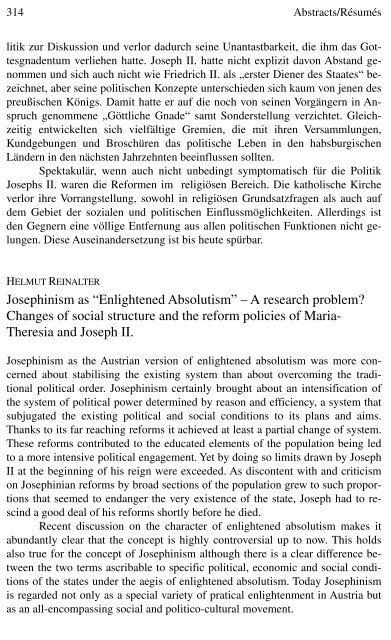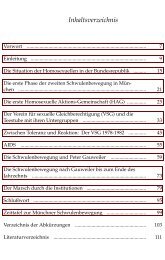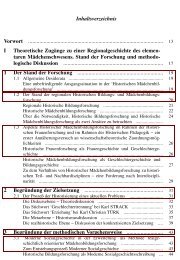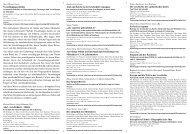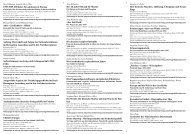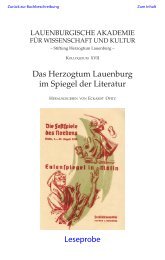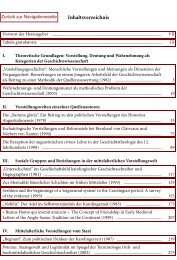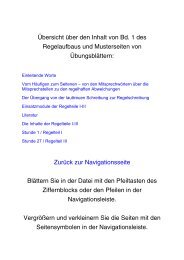Inhaltsverzeichnis/Table des matières - Dr. Dieter Winkler Verlag
Inhaltsverzeichnis/Table des matières - Dr. Dieter Winkler Verlag
Inhaltsverzeichnis/Table des matières - Dr. Dieter Winkler Verlag
Erfolgreiche ePaper selbst erstellen
Machen Sie aus Ihren PDF Publikationen ein blätterbares Flipbook mit unserer einzigartigen Google optimierten e-Paper Software.
314 Abstracts/Résumés<br />
litik zur Diskussion und verlor dadurch seine Unantastbarkeit, die ihm das Gottesgnadentum<br />
verliehen hatte. Joseph II. hatte nicht explizit davon Abstand genommen<br />
und sich auch nicht wie Friedrich II. als „erster Diener <strong>des</strong> Staates“ bezeichnet,<br />
aber seine politischen Konzepte unterschieden sich kaum von jenen <strong>des</strong><br />
preußischen Königs. Damit hatte er auf die noch von seinen Vorgängern in Anspruch<br />
genommene „Göttliche Gnade“ samt Sonderstellung verzichtet. Gleichzeitig<br />
entwickelten sich vielfältige Gremien, die mit ihren Versammlungen,<br />
Kundgebungen und Broschüren das politische Leben in den habsburgischen<br />
Ländern in den nächsten Jahrzehnten beeinflussen sollten.<br />
Spektakulär, wenn auch nicht unbedingt symptomatisch für die Politik<br />
Josephs II. waren die Reformen im religiösen Bereich. Die katholische Kirche<br />
verlor ihre Vorrangstellung, sowohl in religiösen Grundsatzfragen als auch auf<br />
dem Gebiet der sozialen und politischen Einflussmöglichkeiten. Allerdings ist<br />
den Gegnern eine völlige Entfernung aus allen politischen Funktionen nicht gelungen.<br />
Diese Auseinandersetzung ist bis heute spürbar.<br />
HELMUT REINALTER<br />
Josephinism as “Enlightened Absolutism” – A research problem?<br />
Changes of social structure and the reform policies of Maria-<br />
Theresia and Joseph II.<br />
Josephinism as the Austrian version of enlightened absolutism was more concerned<br />
about stabilising the existing system than about overcoming the traditional<br />
political order. Josephinism certainly brought about an intensification of<br />
the system of political power determined by reason and efficiency, a system that<br />
subjugated the existing political and social conditions to its plans and aims.<br />
Thanks to its far reaching reforms it achieved at least a partial change of system.<br />
These reforms contributed to the educated elements of the population being led<br />
to a more intensive political engagement. Yet by doing so limits drawn by Joseph<br />
II at the beginning of his reign were exceeded. As discontent with and criticism<br />
on Josephinian reforms by broad sections of the population grew to such proportions<br />
that seemed to endanger the very existence of the state, Joseph had to rescind<br />
a good deal of his reforms shortly before he died.<br />
Recent discussion on the character of enlightened absolutism makes it<br />
abundantly clear that the concept is highly controversial up to now. This holds<br />
also true for the concept of Josephinism although there is a clear difference between<br />
the two terms ascribable to specific political, economic and social conditions<br />
of the states under the aegis of enlightened absolutism. Today Josephinism<br />
is regarded not only as a special variety of pratical enlightenment in Austria but<br />
as an all-encompassing social and politico-cultural movement.


